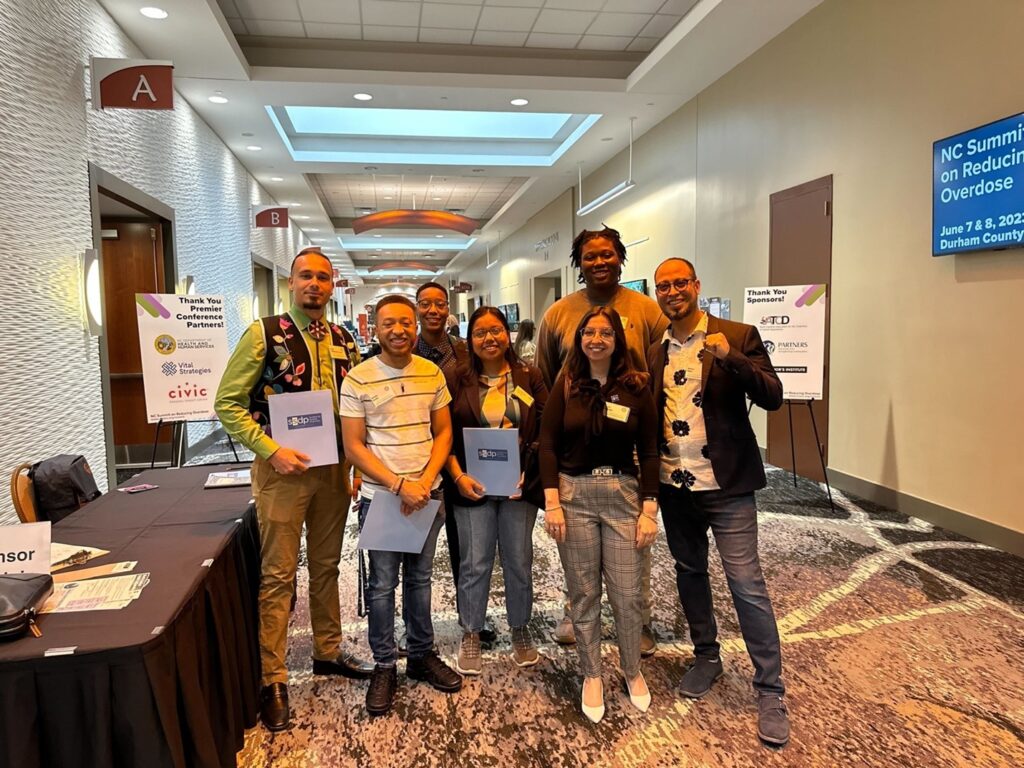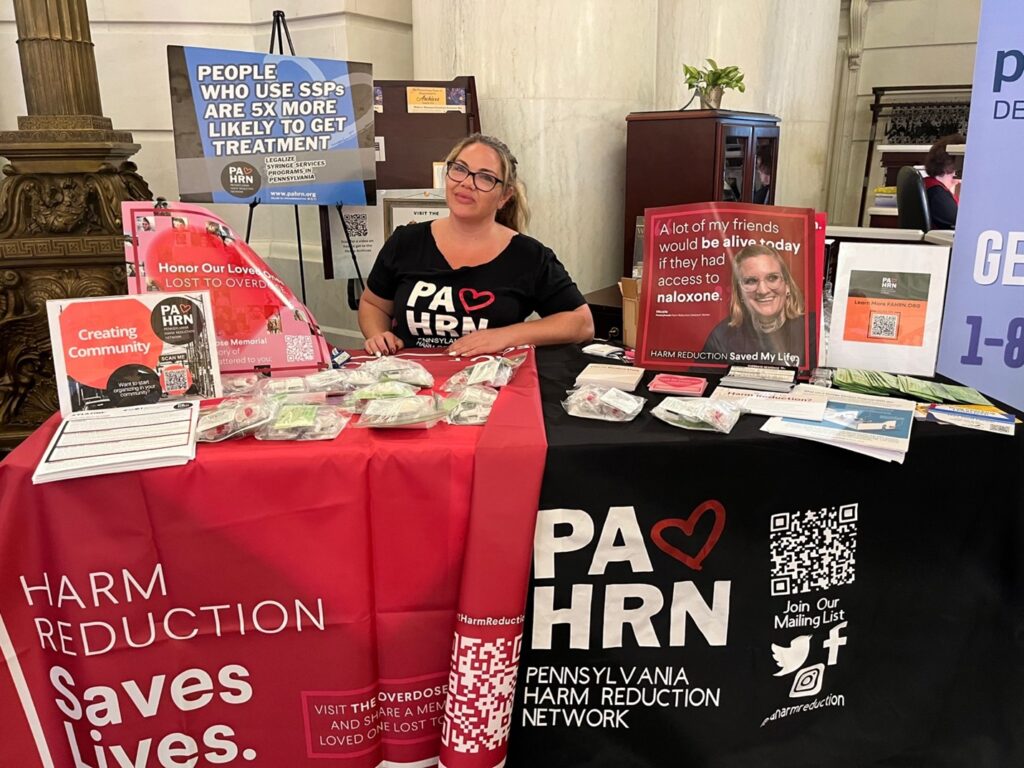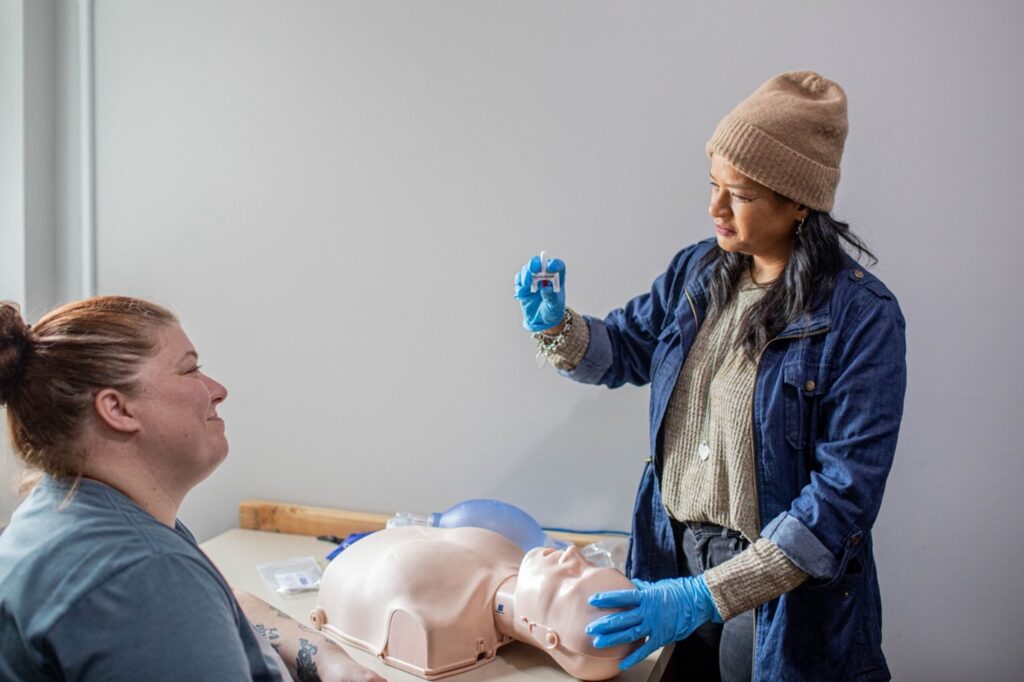As 2023 comes to a close, we are reflecting on the work of Overdose Prevention team at Vital Strategies, highlighting 11 groundbreaking projects from the past year that focus on opioid settlement funding, racial equity, strengthening harm reduction services, and community mobilization.
Promoting Evidence-Based and Inclusive Decision-Making for Local Spending of Opioid Settlement Funds
States and localities have begun receiving new funds under a landmark $26 billion nationwide settlement reached with Johnson & Johnson and the three largest U.S. pharmaceutical drug distributors for their role in fueling the overdose crisis. A total of 46 states and 90% of eligible local governments were included in the deal, and have begun to receive payments. Opioid settlement funds offer a significant opportunity for enhanced support to evidence-based strategies, such as harm reduction services and improved access to buprenorphine and methadone medications for opioid use disorder. Vital Strategies is working to promote the investment of these new funds into programs and interventions grounded in evidence.
- North Carolina Matching Grants for County Harm Reduction Investments: To catalyze investment in syringe service programs and naloxone distribution, Vital Strategies awarded $1.5 million over three years to eight applicants representing 12 North Carolina counties that are leveraging opioid settlement funds to expand community-based naloxone distribution and syringe service programs. These harm reduction services are key to reducing overdose deaths and engaging people who use drugs in health and social services. The first round of funding was disbursed to awardees in January 2023.
- Michigan Counties Opioid Settlement Dashboard: Vital Strategies helped the Michigan Association of Counties launch an Opioid Settlement Dashboard, now available at its Opioid Settlement Resource Center webpage. The dashboard includes information about current funds and county readiness for spending. In tandem with the online dashboard, the Michigan Association of Counties and Vital Strategies produced a Michigan Opioid Settlement Funds Toolkit: A Guide for Local Spending. The toolkit provides local governments, community organizations and health care providers with guidance on how to use opioid settlement funds and tips on key processes. Moreover, it includes strategies for engaging people with lived experience, a critical component for success that is often overlooked.
- Settlement Fact Sheets for All 50 States and the District of Columbia: Vital Strategies collaborated with Christine Minhee, founder of OpioidSettlementTracker and Arielle Edelman McHenry, harm reduction and drug policy consultant, to publish a on the decision-making and settlement funds allocation processes for all 50 states and the District of Columbia. Intended for communities and grassroots groups, these guides demystify how each state will receive and allocate opioid settlement funds. The goal of the guides is to empower community advocates to understand and engage with the settlement planning and spending process so that states’ use of funds is better informed by community voices. Each state fact sheet provides detailed information on: how decisions are made on the use of settlement funding at state and local levels; the role of advisory bodies; parameters states may have on approved uses for the funds; and measures states have put in place to promote transparency and accountability. The settlement fact sheets will be updated in the second quarter of 2024 to include the latest information about the settlement funding.
Advancing Racial Equity
Overdose rates remain highest in Black and Indigenous communities across the United States. Black and American Indian/Alaska Native men are most likely to die of a preventable drug overdose, The rate of fatal overdose among Black men rose by 213% from 2015 to 2020, and by 144% among Black women. We are continuing our work to advance health and race equity in overdose prevention efforts at the community, local, and state levels. Some of our efforts this year included:
- New Jersey Racial Equity Grants to Uplift Community Organizations: To address the surge in overdose deaths in communities of color, Vital Strategies awarded nearly $470,000 in grants to community-based organizations and partnerships in New Jersey led by Black, Indigenous and people of color and serving these communities. The community-based projects will focus on advancing racial equity and harm reduction throughout the state and will address racial harms caused by discriminatory enforcement of drug laws. The New Jersey-based grantees of this initiative, the Health Equity Harm Reduction Grant, include Imperfect Village, Ruby’s Vision, PROCEED, Inc., and Rapha Healthcare Services LLC, with support from Chosen Generation Community Corporation. Funding to these organizations supports activities such as community training and education, community organizing and base-building, capacity building, direct services, outreach, and other strategies.
- Wisconsin Radio Campaign to Support Black Neighborhoods in Milwaukee: Vital Strategies teamed up with three Milwaukee area radio stations to launch a local campaign to highlight on how the overdose crisis is disproportionately affecting Black neighborhoods in Milwaukee, and to encourage community members to have open and honest conversations about drug use and overdose. In addition to raising awareness and building support for harm reduction, the radio ads provided information about how people can access naloxone and other harm reduction resources through the City of Milwaukee Office of African American Affairs. In tandem with the radio ads, the city agency revised its website to include a webpage dedicated to overdose prevention and harm reduction resources. Jammin’ 98.3’s Earl Stokes and Don Black, AUDACY Radio/Hot 105.7 morning host Promise, and iHeartMedia/V100.7 FM afternoon drive host Reggie Brown participated in this campaign, which ran from Aug. 14 through November. Vital Strategies will continue to expand this campaign to other cities, including Philadelphia.

- Students for Sensible Drug Policy Fellowships in North Carolina: Rates of teen overdose deaths in the United States nearly doubled from 2010 to 2020 and increased by another 20% in 2021, underscoring the importance of youth-led overdose prevention efforts. The national youth-led grassroots network Students for Sensible Drug Policy announced the launch of the Youth Overdose Prevention Fellowship in North Carolina, funded by Vital Strategies. Six young adults from across the state were selected to participate in the fellowship, which began in May. During this six-month program, the youth advocates provided harm reduction education and advocated for accessible, evidence-based drug policies, especially among young people from Black, Indigenous, Latinx, and other communities of color. After hosting special events for International Overdose Awareness Day on Aug. 31, the fellows graduated from the program in September.
Strengthening Harm Reduction Services and Mobilizing Communities to Create Lasting Change

Vital’s Overdose Prevention Program continued to focus on scaling up naloxone access and community-based harm reduction services. We launched or supported work to strengthen related policies and assist state governments with implementing expanded and strengthened services. Moreover, we continued resourcing communities and neighborhoods to organize for locally designed, health-based approaches to drug use to generate support for harm reduction and other social supports.
Montclair State University Launched a Harm Reduction Certificate Program
With support from Vital Strategies, Montclair State University launched an online graduate-level certificate, Harm Reduction Approaches to Substance Use.” It is the first program designed to certify students in principles of harm reduction and will offer participants training on de-stigmatizing, social justice-oriented, trauma-informed strategies for engagement with people who use drugs. The curriculum is aimed primarily at students in the university’s graduate social work program. Students will be able to enroll beginning next year.
DIY Boxes Events for International Overdose Awareness Day
For International Overdose Awareness Day, Vital Strategies mailed out 300 “DIY Boxes” to groups in more than 21 states that offered a menu of campaign content and products to organize events, including: digital resources, localized state videos on the overdose crisis, and overdose prevention education. The DIY boxes also include various physical items to display and distribute. This national action was part of the national, award-winning “Support Harm Reduction” multimedia campaign that highlights key interventions that are proven to save lives.
New Mexico’s Launch of Online Portal for Naloxone
Vital’s embedded staff in New Mexico worked on the “Naloxone Saves” campaign, which was launched on International Overdose Awareness Day, along with the new website, NMHarmReduction.org. The mail-order system is up and running and orders are being fulfilled through Alianza, a harm reduction provider in New Mexico, which is receiving and responding to approximately 20 orders per day.
Support People Who Use Drugs Through Addressing the Harms of the Criminal Legal System

A pillar of the Overdose Prevention Program’s work is to end reliance on punitive and coercive responses to drug use, and to prevent the criminalization of people for using drugs. Criminal legal system involvement creates extraordinarily elevated risks offatal overdose, and systems that are based on coercion and mandates to abstinence also show poor and harmful impacts on health. Here are ways we furthered the goal this year of investing in a supportive, voluntary, evidence-based, community-rooted response to drug use, rather than punishment:
Dream.Org: “Public Health is Public Safety” Statewide Campaign
Dream.Org developed a statewide campaign in Kentucky, “Public Health is Public Safety,” which addresses the criminalization of people who use drugs. Kentucky has among the highest incarceration rates in the country, shaped in part by the criminalization of drug possession. This initiative highlights and raises awareness of the harms that punitive and carceral responses to drug use have caused, disproportionately affecting Black communities and other populations of color. These include stigma, disruption in treatment and access to services, dissolution of families, and millions of wasted taxpayer dollars.
Addressing Structural Harms by Partnering with Voices of Community Activists and Leaders in Kentucky

Voices of Community Activists and Leaders—Kentucky (VOCAL-KY) conducted grassroots organizing among people who use drugs and low-income, marginalized communities in Louisville to promote a harm reduction approach to drug use. Through leadership development, education and community engagement, VOCAL-KY is working to prioritize structural changes that address the harms of criminalizing people who use drugs by: organizing local discussions that give voice to the needs and views of people who use drugs; establishing and publicizing an agenda of key areas for policy change; and creating opportunities for local education and awareness of these issues. VOCAL-KY draws on over 20 years of experience building a movement of low-income people dedicated to ending the AIDS epidemic, the war on drugs, mass incarceration, and homelessness.
As we approach the end of 2023, we remember and honor the memory of our loved ones lost to overdose and acknowledge the hard work of people in overdose prevention. While we still have a long way to go, we are committed to uplifting communities across the United States and innovative initiatives that support people who use drugs. In the new year, we hope to continue in our efforts to strengthen harm reduction across the U.S., and ultimately end overdose.
About our Overdose Prevention Program
Vital’s Overdose Prevention Program works to strengthen and scale evidence-based, data-driven policies and interventions to create equitable and sustainable reductions in overdose deaths. Work across seven U.S. States is supported by funding from the Bloomberg Philanthropies Overdose Prevention Initiative, launched in 2018, and by targeted investments from other partners.
Learn more here.
Get Our Latest Public Health News
Join our email list and be the first to know about our public health news, publications and interviews with experts.